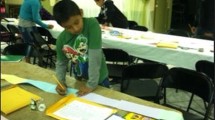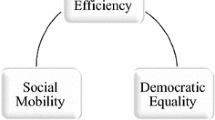Abstract
This study explores how activities developed by science experts in partnership with middle school teachers were employed and interpreted. The goals of this partnership were to (a) help the science teacher meet earth science content standards in new ways, (b) expose students to ‘real world’ experiences outside their school setting, and (c) positively impact teacher practice by providing a program to be used as a catalyst for future learning. Over 300 sixth graders mostly underrepresented science students attended activities at an aquarium serving an urban West Coast urban context. Science teachers, non-science teachers, scientists, and volunteers were all engaged in pre-trip instruction, professional development opportunities, and follow-up activities as this partnership effort explored ways to enhance local literacy initiatives across the curriculum. Results suggest that teacher beliefs about informal education impacted their view and participation in the program and the level of submersion of teachers in collaboration strongly affects the ability to serve underrepresented students on informal excursions. Implications for teacher education and outreach are discussed.
Similar content being viewed by others
References
American Association for the Advancement of Science. (1989). Science for all Americans: Project 2061. Washington, DC: AAAS.
Anderson, D., & Lucas, K. B. (1997). The effectiveness of orienting students to the physical features of a science museum prior to visitation. Research in Science Education, 27, 485–495.
Ash, D. (2008). Thematic continuities: Talking and thinking about adaptation in a socially complex classroom. Journal of Research in Science Teaching, 45, 1–30.
Banks, J. A., & Banks, C. A. M. (Eds.). (2004). Handbook of research on multicultural education (2nd ed.). San Francisco, CA: Jossey-Bass.
Baram-Tsabari, A., Sethi, R. J., Bry, L., & Yarden, A. (2009). Asking scientists: A decade of questions analyzed by age, gender, and country. Science Education, 93, 131–160.
Basu, S. J. (2008). How students design and enact physics lessons: Five immigrant Caribbean youth and the cultivation of student voice. Journal of Research in Science Teaching, 45, 881–899.
Brotman, J. S., & Moore, F. M. (2008). Girls and science: A review of four themes in the science education literature. Journal of Research in Science Teaching, 45, 971–1002.
Chávez, R. C., & O’Donnell, J. (Eds.). (1998). Speaking the unpleasant: The politics of (non)engagement in the multicultural education terrain. New York, NY: State University of New York Press.
Corbin, J., & Strauss, A. (2008). Basics of qualitative research: Techniques and procedures for developing grounded theory (3rd ed.). Thousand Oaks, CA: Sage.
Ellenbogen, K. M. (2002). Museums in family life: An ethnographic case study. In G. Leinhardt, K. Crowley, & K. Knutson (Eds.), Learning conversations in museums (pp. 81–101). Mahwah, NJ: Erlbaum.
Falk, J. H. (1983). Field trips: A look at environmental effects on learning. Journal of Biological Education, 17, 137–141.
Falk, J. H., & Adelman, L. M. (2003). Investigating the impact of prior knowledge and interest on aquarium visitor learning. Journal of Research in Science Teaching, 40, 163–176.
Falk, J. H., & Balling, J. D. (1982). The field trip milieu: Learning and behavior as a function of contextual events. Journal of Educational Research, 76, 22–28.
Falk, J. H., & Dierking, L. D. (1992). The museum experience. Washington, DC: Whalesback.
Falk, J. H., Moussouri, T., & Coulson, D. (1998). The effect of visitors’ agendas on museum learning. Curator, 41, 107–120.
Gallego, M., & Finkelstein, N. (2005). When the classroom isn’t in school: The construction of scientific knowledge in an after-school setting. In R. K. Yerrick & W. M. Roth’s (Eds.), Establishing scientific discourse communities. Mahwah, NJ: Lawrence Erlbaum Publishers.
Gay, G. (2000). Culturally responsive teaching: Theory, research, and practice. New York, NY: Teachers College Press.
Gay, G. (2002). Preparing for culturally responsive teaching. Journal of Teacher Education, 53, 106–116.
Gennaro, E. D. (1981). The effectiveness of using previsit instructional materials on learning for a museum field trip experience. Journal of Research in Science Teaching, 18, 275–279.
Glenn, J. (2000) Before it’s too late. A report to the nation from the National Commission on Mathematics and Science Teaching. Washington, DC: U.S. Government.
Griffin, J. (1994). Learning to learn in informal settings. Research in Science Education, 24, 121–128.
Griffin, J., & Symington, D. (1997). Moving from task-oriented to learning-oriented strategies on school excursions to museums. Science Education, 81, 763–779.
Katz, P., & McGinnis, J. R. (1999). An informal elementary science education program’s response to the national science education reform movement. Journal of Elementary Science Education, 11, 1–15.
Koran, J. J., Morrison, L., Lehman, J., Koran, M. L., & Gandara, L. (1984). Attention and curiosity in museums. Journal of Research in Science Teaching, 21, 357–363.
Korthagen, F., & Kessels, J. (1999). Linking theory and practice: Changing the pedagogy of teacher education. Educational Researcher, 2(4), 4–17.
Ladson-Billings, G. (1994). The dreamkeepers: Successful teachers of African American children. San Francisco, CA: Jossey-Bass.
Ladson-Billings, G. (1999). Preparing teachers for diverse student populations: A critical race theory perspective. Review of Research in Education, 24, 211–248.
Little, J. W. (1999). Organizing schools for teacher learning. In L. Darling-Hammond & G. Sykes (Eds.), Teaching as the learning profession: Handbook of policy and practice (pp. 233–262). San Francisco, CA: Jossey-Bass.
Lortie, D. (1975). Schoolteacher: A sociological study. Chicago: University of Chicago Press.
Nieto, S. (1999). The light in their eyes. New York, NY: Teachers College Press.
Organization for Economic Co-operation and Development. (2007). PISA 2006: Science competencies for tomorrow’s world. France: Paris.
Orion, N. (1993). A model for the development and implementation of field trips as an integral part of the science curriculum. School Science and Mathematics, 93, 325–331.
Orion, N. (1999, April). An holistic approach in making outdoor activities an integral part of the formal learning process in schools. Paper presented at the national association for research in science teaching annual meeting, Boston, MA.
Orion, N., & Hofstein, A. (1994). Factors that influence learning during a scientific field trip in a natural environment. Journal of Research in Science Teaching, 31, 1097–1119.
Osborne, R., & Wittrock, M. C. (1985). The generative learning model and its implications for science education. Studies in Science Education, 12, 59–87.
Peshkin, A. (1988). In search of subjectivity—One’s own. Educational Researcher, 17(7), 17–21.
Rodriguez, A. J. (2006). The multiple faces of agency. Rotterdam, the Netherlands: Sense Publishers.
Rodriguez, A. J., & Kitchen, R. S. (2005). Preparing mathematics and science teachers for diverse classrooms: Promising strategies for transformative pedagogy. Mahwah, NJ: Lawrence Erlbaum Associates, Publishers.
Rodriguez, A. J., Zozakiewicz, C., & Yerrick, R. (2005). Using prompted praxis to improve teacher professional development in culturally diverse schools. School Science and Mathematics Journal, 105, 352–362.
Rogoff, B. (1994). Developing understanding of the idea of communities of learners. Mind, Culture, and Activity, 1, 209–229.
Roth, W. M., & Lee, S. (2004). Science education as/for participation in the community. Science Education, 88, 263–291.
Sadler, T. D., & Zeidler, D. L. (2009). Scientific literacy, PISA, and socioscientific discourse: Assessment for progressive aims of science education. Journal of Research in Science Teaching, 46, 909–921.
Spradley, J. P. (1980). Participant observation. New York, NY: Holt.
Stake, R. E. (1978). The case study method in social inquiry. Educational Researcher, 7(2), 5–8.
The Mendoza Commission. (2000). Land of plenty: Diversity as America’s competitive edge in science, engineering, and technology. Report of the congressional commission on the advancement of women and minorities in science, engineering and technology development. Washington, DC: Author.
The National Commission on Teaching and America’s Future. (1996). What matters most: Teaching for America’s future. New York: Author. Retrieved September 1, 2003 from http://www.tc.colimbia.edu/~teachcomm.
Villegas, A. M., & Lucas, T. (2002). Preparing culturally responsive teachers: Rethinking the curriculum. Journal of Teacher Education, 53, 20–32.
Vygotsky, L. S. (1978). Mind in society. Cambridge, MA: Harvard University Press.
Yerrick, R., Parke, H., & Nugent, J. (1997). Struggling to promote deeply rooted change: The filtering effect of teachers’ beliefs on understanding transformational views of teaching science. Science Education, 81, 137–159.
Author information
Authors and Affiliations
Corresponding author
About this article
Cite this article
Yerrick, R., Beatty-Adler, D. Addressing Equity and Diversity with Teachers Though Informal Science Institutions and Teacher Professional Development. J Sci Teacher Educ 22, 229–253 (2011). https://doi.org/10.1007/s10972-011-9226-3
Published:
Issue Date:
DOI: https://doi.org/10.1007/s10972-011-9226-3




